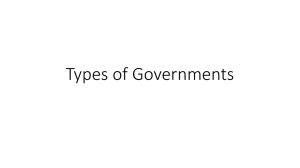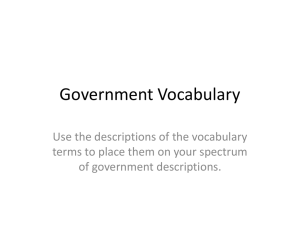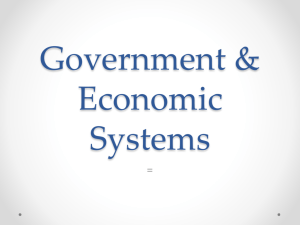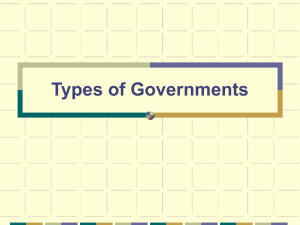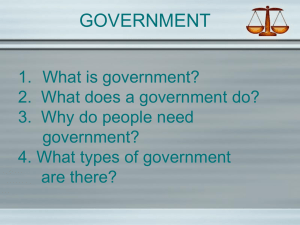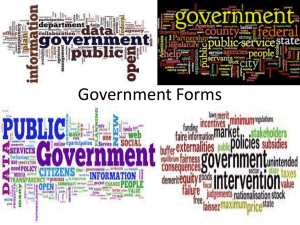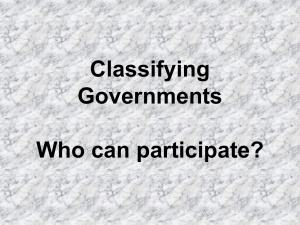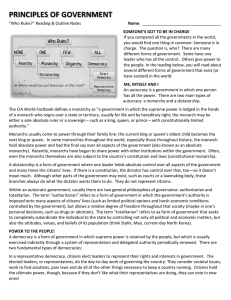File
advertisement
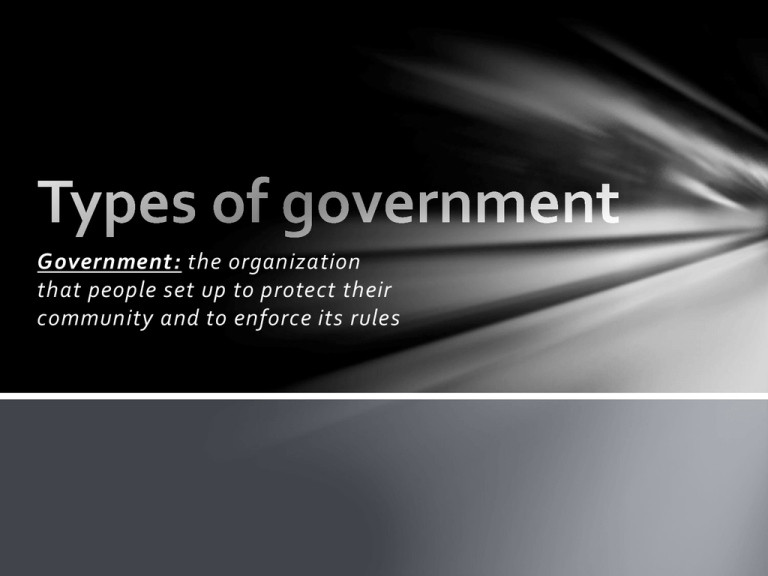
Government: the organization that people set up to protect their community and to enforce its rules Monarchy Main characteristic of a monarchy is that the ruler inherits power Monarchs fulfill their role as supreme ruler by surrounding themselves with followers and advisors who help them govern Rule by Divine Right • In older forms of monarchy, the ruler claimed absolute power • Claimed to hold this power by “divine right”, or the will of God • Ordinary people had no rights or freedoms, except those that the monarch allowed. Constitutional Monarchy • In recent times, monarchs have shared power with an elected legislature • Subjects enjoy traditional, protected rights • Great Britian is an example Republic • A government without a king or queen • Often will choose representatives to make decisions • The United States is a republic Democracy • Government authority is based on the will of the people. • Direct Democracy: • Invented by the Greeks in ancient Athens • Democracy is a greek word that means “people-power” • People voted on issues directly • Representative Democracy: • Developed by the Romans • People elected representatives that met in assemblies • The United States has a Representative Democracy Dictatorship • A system of government in which a single person or small group exercises complete power over others. • A dictator does not inherit their power like a king, they either seize control by force or are placed into a position of authority by others. • Sometimes the military will sometimes seize power and establish a dictatorship • Citizens in a dictatorship have few rights • Main advantage of a dictatorship is that decisions can be made quickly Dictatorship: Example • Robert Mugabe was elected as President of Zimbabwe • He quickly became a dictator who used police to block opponents from voting • He even arrested and tortured opponents Totalitarian Systems • Dictators will often establish totalitarian systems in which the government controls all aspects of individual life • People can only belong to organizations controlled by the government • No separate political parties, labor unions, or other organizations • Government controls or prohibits all churches and religious groups • One leader or political party maintains total control over all aspects of society • Government controls all television, radio, and newspapers • All dissent is suppressed and citizens are terrorized by secret police. • People who oppose the government are arrested and sent to labor camps or killed Theocracy • A government run by religious leaders • Claims to be directed by God, or divinely blessed • No legal separation between church and state • Citizens of other faiths are often excluded or expelled • Iran’s Theocracy: Iran’s Supreme Leader: Ayatollah Khamenei • Muslim religious leaders seized power in Iran in 1979 • Iranian Constitution emphasizes the importance of religion and Islamic law (sharia law) • Has a Theocratic and democratic government • Voters elect the President and representatives to the legislature but these officials remain subject to the control of Iran’s Supreme Leader • The Supreme Leader is the head of government, even above the elected President • The Supreme Leader interprets religious law, can dismiss the President, and can declare war. Iran’s President: Hassan Rouhani Thomas Jefferson – Democracy Joseph Stalin – Dictator Louis XIV - Monarchy
